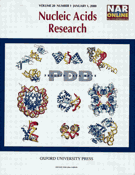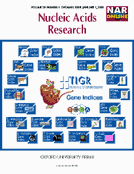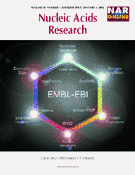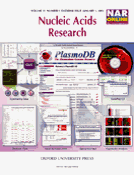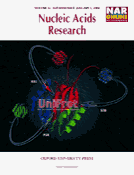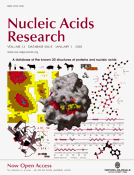|
Molecular biological databases:
An overview about molecular biological databases is given each year in a special issue (January) of Nucleic Acids Research.
The published articles are very useful to get fast and qualified answers to related questions.
Here you will find articles of the last six years:
Databases of databases:
- DBCAT DataBase CATalog
- SRS catalog of databases
Sequence databases:
Nucleotide sequences 
- EMBL Nucleotide Sequence Database
- GenBank at NIH
- DNA Data Bank of Japan
Amino acid sequences

- Protein database: SwissProt and TrEMBL
- SwissProt: Example 1 of a SwissProt entry
- SwissProt: Example 2 of a SwissProt entry (raw data)
- SwissProt: Example 3 of a SwissProt entry (FASTA format)
- SwissProt: Example 4 of a SwissProt entry ("nice view")
- Protein Information Resource: PIR
- UniProt: Up until the end of 2003, the three major protein sequence databases, Swiss-Prot, PIR and TrEMBL, had been run in an independent fashion from each other. Now, the Swiss Institute of Bioinformatics (SIB), the Protein Information Resource at Georgetown University Medical Centre (PIR) and The European Bioinformatics Institute (EBI) work as a single force to produce UniProt: a single, comprehensive and stable resource for information on protein sequences and their function.
Datenbanken von Protein families an domains:
- The Blocks Database (multiple alignments of conserved regions of protein families)
- COG (Clusters of Orthologous Genes
- The DOMO Database of Homologous Protein Domain Families
- The eMOTIF Database (protein sequence motif determination and searches)
- Modules - Mobile Protein Domains
- The Pfam Protein Family Database at the Sanger Center or Pfam at WUStL (multiple sequence alignments and hidden Markov models of common protein domains)
- The PRINTS Protein Motif Fingerprint Database (hierarchical gene family fingerprints)
- The ProClass Database (protein families defined by PIR superfamilies and PROSITE patterns)
- The ProDom Protein Domain Database (protein domain families)
- The PROSITE Database of Protein Families and Domains (biologically significant protein patterns and profiles)
- SBASE Protein Domain Sequences (annotated protein domain sequences)
- SMART, a Simple Modular Architecture Research Tool
- SUPFAM: SUPer-FAMilies of Proteins (sequence families correlated to structure)
- InterPro, an Integrated Documentation Resource for Protein Families, Domains and Functional Sites (Pfam, PRINTS, PROSITE, ProDom, SMART, SWISS-PROT + TrEMBL) (integrated documentation resource for protein families, domains and sites)
- iProClass, an Integrated, Comprehensive and Annotated Protein Classification Database (annotated protein classification database with structure and function information)
- PDB: Protein Data Bank (structure data determined by X-ray crystallography and NMR)

- CATH Protein Structure Classification (hierarchical classification of protein domain structures according to Class, Architecture, Topology, and Homology)
- Dali Domain Dictionary, a Fully Automatic Evolutionary Classification of Protein Folds
- HSSP (structural families and alignments; structurally conserved regions and domain architecture)
- LPFC Library of Protein Family Cores
- PALI (Phylogeny and ALIgnment of homologous protein structures)
- SCOP: Structural Classification of Proteins (familial and structural protein relationships)
- SUPERFAMILY (Assignments of proteins to structural superfamilies)
- DOLOP - Database Of bacterial LipOProteins
- MEROPS - the Peptidase Database
- Sortase Database #1
- Sortase Database #2
Latest update of content: September 20, 2005
Ralf Koebnik
Institut de recherche pour le dèveloppement
UMR 5096, CNRS-UP-IRD
911, Avenue Agropolis, BP 64501
34394 Montpellier, Cedex 5
FRANCE
Phone: +33 (0)4 67 41 62 28
Fax: +33 (0)4 67 41 61 81
Email: koebnik(at)gmx.de
Please replace (at) by @.
 Back to main page
Back to main page
|


